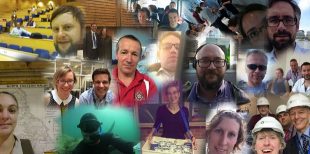Last year, Defra group was set a challenge: a target to release at least 8000 new open datasets in one year.
As you may have heard, we smashed the target. What you might not realise is that the way that this was achieved was a bit unconventional.
Coordination was fairly light – in fact, the data programme didn’t get properly going until the start of this year (many of us in the data programme team didn't join until then either).
Without the infrastructure in place, we had to learn by doing, which meant we had to be agile. There were challenges along the way, but delivery absolutely depended on a concerted effort from people across the group. The sad thing is that, because people doing data fed into other people in their respective organisations, who fed into others, who then published the data, sometimes only a few hints at who had done the work reached us in the datacave.
We don’t necessarily know who these people are. We feel like we've unwrapped a lot of presents, but either didn't read the label to see who they were from, or the labels just fell off.
This feeds into a larger question about recognition. Through releasing data and moving towards a position where we’re acting as a platform for others to come in and innovate, we’re becoming a more open organisation, but for many people government is fairly anonymous. What does a civil of public servant look like?
There are a growing number of #defranauts, people who (shock!) self-identify as Defra staff on Twitter.

But even for those whose identity outside of work (yes, we do also do other things outside work) leaves little room for: ‘works @DefraGovUK’ on their bio – #defraselfies provide an easy way for those wanting to join in to show just how diverse a bunch of people we are, internally and externally (and generally just show off).
In the Data Programme, we try to work ‘out in the open’ and have previously brought people together, internally, and those from outside who are interested in our work, at events such as our DataMarket at Nobel House. The Environment Agency had an ODX event to celebrate their work in data from across their own vast organisation (they make up roughly have of Defra group). Cross-team unconferences and events have spread – a highlight earlier this month being the Science and Innovation Fair, which included a fair bit of data itself, and we've also seen the great work of Defra's Internal Communications in fostering 'big conversations' in Defra offices across the country.
It seems we’re all talking more – which is great! But in terms of identity, those working in what we’re calling the #defradatafunction might still be no better off in terms of recognising their peers.
Being more visible on Twitter and bringing people into the conversation is one way of doing this. But it’s also important that we speak face-to-face. Recognising that there is such a thing as the #defradatafunction was the first step, and on 29 November we’ll be bringing everyone together to talk about what our work means for Defra at Icentrum campus in Birmingham.
We're aware that for previous events, we haven't made it clear whether you have to work for Defra to attend – largely because we're so used to working with others outside Defra. On this occasion, while we want to focus on #defradatafunction people, there are a limited number of places for you lovely people outside Defra* (which is why this is appearing on a public-facing blog).
If you work for Defra in the #defradatafunction and want to come to meet other people like you (in Birmingham on 29 November), please register for the #defradatafunction event on Eventbrite.
*we'll come up with some kind of fair/rational/random way of getting as many of you involved as we can.
Recent Comments